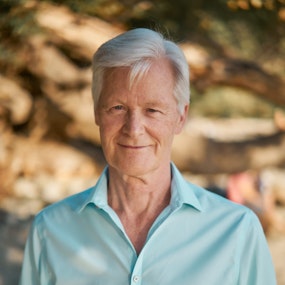
From Refugee to Wellness Expert: Take Inspiration from Udo Erasmus’ Quest for Personal Growth
Does this sound familiar? You've been told that achieving personal growth and self-improvement requires simply going through the motions, following a set path, and conforming to societal norms. Yet, despite your efforts, you're left feeling unfulfi...

Does this sound familiar? You've been told that achieving personal growth and self-improvement requires simply going through the motions, following a set path, and conforming to societal norms. Yet, despite your efforts, you're left feeling unfulfilled, stuck, and longing for something more. The pain of taking action without seeing the desired results can be disheartening and discouraging. But here's the truth: true personal growth and self-improvement come from seeking knowledge, embracing new perspectives, and constantly evolving. It's time to break free from ineffective actions and unlock the transformative power of seeking knowledge and personal growth.
Udo Erasmus, a highly respected expert in the field of personal growth and self-improvement, joins us as a guest for today's episode. With a strong focus on turning health into a teachable field based on nature and human nature, Udo has dedicated his life to unraveling the mysteries of optimal well-being. Born during the Second World War and having experienced life as a refugee, Udo's early challenges shaped his deep desire to understand how individuals can live in harmony. Through extensive studies in science, biology, psychology, and medicine, Udo has acquired a vast knowledge base on the intricacies of human health. Additionally, his exploration of psychedelic experiences has provided him with unique insights into the limitless potential of the human mind. With his profound understanding and practical approach, Udo aims to empower individuals to tap into their inner potential and embrace a life of abundance.
“When a kid doesn't have a place that has support, either they die or they find support inside. And I found the support inside, so I was always a little bit inward.”
Books and Resources
From Adversity to Abundance: Inspiring Stories of Mental, Physical, and Financial Transformation
Fats That Heal, Fats That Kill: The Complete Guide to Fats, Oils, Cholesterol and Human Health
Connect with Udo Erasmus:
WEBSITE: https://udoerasmus.com/
LINKEDIN: https://www.linkedin.com/in/udoerasmus/
FACEBOOK: https://www.facebook.com/theudoerasmus/
INSTAGRAM: https://www.instagram.com/udoerasmus/
Connect with us
WEBSITE: https://www.adversity2abundance.com
Leave us a rating or review: https://www.adversity2abundance.com/reviews/new/ or here
Got comments, feedback or suggestions? We’d love to hear it! https://www.adversity2abundance.com/contact/
Follow From Adversity to Abundance Podcast
FACEBOOK: https://www.facebook.com/profile.php?id=100089126144055
INSTAGRAM: https://www.instagram.com/adversitytoabundancepodcast/
LINKEDIN: https://www.linkedin.com/company/89949391/admin/feed/posts/
YOUTUBE: https://www.youtube.com/channel/UChYrpCUlqFYLy4HngRrmU9Q
Connect with Jamie
BOOK: From Adversity to Abundance: Inspiring Stories of Mental, Physical, and Financial Transformation
LINKEDIN: https://www.linkedin.com/in/jamie-bateman-5359a811/
TWITTER: https://twitter.com/batemanjames

Udo Erasmus
Health, Wellness, Spiritual and Human Nature Educator
The legendary Udo Erasmus is the co-founder of Udo’s Choice line, which can be found in Whole Foods and other health food stores worldwide. Udo designed the machinery for making oils with health in mind and pioneered flax oil, a billion-dollar industry. However, Udo walked a difficult path to become the man he is today. Being a child of war, Udo’s life began with intense
struggle. As an adult, he got pesticide poisoning in 1980, leaving doctors at a loss regarding treatment. Deciding to take his health into his own hands, Udo began researching, and his discoveries led him to a passion for finding the answers to life’s big questions which would hopefully one day bring him and the world peace.
Today, Udo is an acclaimed speaker and author of many books, including the best-selling "Fats That Heal Fats That Kill", which has sold over 250,000 copies. He teaches at events hosted by Tony Robbins and Deepak Chopra, has keynoted an international brain health conference, and has traveled to over 30 countries to conduct thousands of live presentations, media interviews, and staff trainings impacting more than 25,000,000 lives with his message on oils, health, peace, nature, and human nature. Udo has an extensive education in biochemistry, genetics, biology, and nutrition, including a master’s degree in counseling psychology.
**Form submitted by Teresa Westsik, Podcast Relationship Manager with Interview Valet




